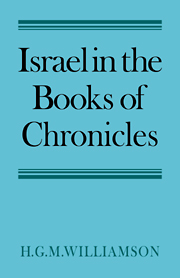Book contents
- Frontmatter
- Contents
- Foreword
- List of Abbreviations
- 1 Introduction
- PART ONE The Extent of the Chronicler's Work
- 2 2 Chronicles 36: 22f. and Ezra 1: 1–3a
- 3 The Evidence of the Greek Versions
- 4 Vocabulary and Style in Chronicles, Ezra and Nehemiah
- 5 Ideology
- 6 The Start of the Chronicler's Work
- PART TWO The Concept of Israel in the Books of Chronicles
- Bibliography
- Index of Passages Cited
- Index of Modern Authors
- General Index
6 - The Start of the Chronicler's Work
Published online by Cambridge University Press: 26 February 2010
- Frontmatter
- Contents
- Foreword
- List of Abbreviations
- 1 Introduction
- PART ONE The Extent of the Chronicler's Work
- 2 2 Chronicles 36: 22f. and Ezra 1: 1–3a
- 3 The Evidence of the Greek Versions
- 4 Vocabulary and Style in Chronicles, Ezra and Nehemiah
- 5 Ideology
- 6 The Start of the Chronicler's Work
- PART TWO The Concept of Israel in the Books of Chronicles
- Bibliography
- Index of Passages Cited
- Index of Modern Authors
- General Index
Summary
In 1 Chr. 1–9, genealogies of the tribes of Israel are presented. Ch. 1 traces the line of election from Adam to Jacob, whilst the remainder deals, with considerable variation in the amount of attention given, with most of the tribes of Israel. Zebulun and Dan, however, appear to be omitted.
Three approaches have been adopted towards this material in critical scholarship. A few deny all nine chapters to the Chronicler, arguing that they are entirely a later addition to his work. Others, however, argue that all or most of these lists were put into substantially their present shape by the Chronicler, whilst the third group take a position between these two. They concede that the Chronicler may have included a brief summary of tribal genealogies in his original work, but argue that much of the material as we now have it represents later additions.
The first of these approaches, championed in particular by Welch, has now been generally abandoned. It has been shown that there are too many points of contact with the central interests and theology of the Chronicler's narrative to enable us to deny these chapters to him. Fortunately, Johnson has dealt with the issue directly in his monograph on the Biblical genealogies, so that we may be content for the most part to refer to his discussion. We would merely single out as of particular importance the concern throughout for the full complement of twelve tribes, which contrasts with the more exclusivist attitude of the Jerusalem community as reflected in Ezr.-Neh.
- Type
- Chapter
- Information
- Israel in the Books of Chronicles , pp. 71 - 86Publisher: Cambridge University PressPrint publication year: 1977



